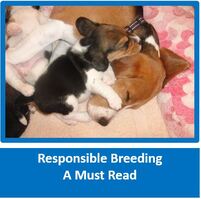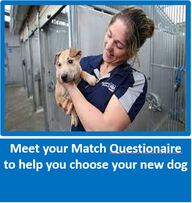WHEN ADOPTING OR BUYING A DOG – THE BUCK STOPS WITH YOU!
Scotty Valadao - www.friendsofthedog.co.za
Scotty Valadao - www.friendsofthedog.co.za

We spend hours, sometimes days and weeks into thinking what kind of car would suit our families, and undertake intensive investigation, but when it comes to dogs that can be with us for well over a decade, have sharp teeth, share our homes, interact with our children, we allow ourselves to rush into a decision with little thought - this the fault of professionals – we have not educated enough or asked you to think in this manner!
What we will try to do here, is to give you information regarding the 3 most common places that you could adopt a dog from; things to be aware of , questions you should ask yourself -what to expect from the places that offer dogs for sale or adoption. This is a complex topic, so we have supplied you with some links in order for you to take your research further.
The responsibility of adopting or purchasing a dog should be a combined effort – between you and the place the dog is obtained from, unfortunately this is not always the case, and the responsibility then falls squarely on your shoulders.
What is important to bear in mind, is that there is also a responsibility towards the dog in question – each and every time a dog is returned to a shelter or similar, there is tremendous physiological damage and stress involved for the dog, and the chances of a future successful adoption are reduced – here we are not even going into the subject of the guilt and heartbreak that the family that adopted and returned the dog goes through!
When we take a dog into our homes it is often an emotional decision, and to assist you in making an educated decision and choice, we have supplied you with 3 further articles at the bottom, which will give you more knowledge before you make the final decision.
If you come across a post on Facebook or are contacted by somebody who asks you to take a dog as otherwise it will be euthanized – don’t respond – your responsibility is to your family and any other dogs you may have, not to the poor dog that is being advertised. Right, let’s have a look at the 3 most common places where dogs are obtained from.
Breeders
Although shelters are our first choice when it comes to adopting a dog, it is also important to have Top Quality Breeders (TQB). If you want a particular breed, whether for showing or competition, or you just love the breed, or want to ensure you get a breed that is good with children or other dogs, we need to have Breeders available. Another point where breeders are concerned, is if we did not have them, then many of the breeds would simply become extinct, as has happened in the past. However, there are Top Quality Breeders, and then there are ‘other breeders’!
Top Quality Breeders (TQB)
These are people who have an absolute love and passion for their particular breed and do all they can to ensure that their dogs are the best that are on offer. Very often, a TQB will actually interview you, visit your home, and ensure that you are the best home for their pups – there is often a waiting list for pups such as this, as this type of breeders only breed when they know they have the right homes for their pups.
The goal of breeding dogs should be to produce offspring that are free from inherited disease /illnesses, and very importantly, have temperament traits that allow them to co-exist with both people and other animals without conflict – the breeder should do all in his power to ensure that this occurs, that breed standards are met, and any dogs that fail in above, should never be bred with.
There should be a contract between you and the breeder, and the breeder should inform you about any inherited disease their breed is prone too, and disclose all relevant genetic tests available, plus let you know, and show you proof of any tests they themselves have done. Ideally you should see results of these tests for the pup in question, their littermates, sire (dad), dam (mom) and even grandparents. Getting a pup from a TQB is more expensive, however, to breed a top-quality dog is an expensive, and time-consuming affair, and is often done simply for the love of the breed. Going this route gives you the highest chances of success of what you are looking for, and often an extra bonus, is that if you ever find yourself in a position that the pup may need to be returned, either when young, or later in life, then the breeder will assist.
In SA the most popular Breeding Registry is KUSA (Kennel Union of SA), and you should ensure that the breeder is registered with same – even going to the extent of actually phoning KUSA and confirming. However! KUSA just ensures that the breeder is registered, and their pups meet the breed standard and have papers, no checks on breeders and the conditions the dogs are kept in is done – it is your responsibility to ensure that the breeder is indeed, a TQB. Here is a link to another article Don’t Get a Purebred Until You Read This, ( https://www.friendsofthedog.co.za/dont-buy-a-purebred-dog-until-you-read-this.html )
which will give you more information.
“Other Breeders”
After explaining above as to what a TQB actually is, unfortunately, ‘Other Breeders’ are the exact opposite. Dogs, over the last decade or so have become a multi-billion industry, and there are far too many people that are ‘breeding’ just to make a quick buck. Unfortunately, this industry is not legislated, and so many unsuspecting people end up getting a pup from breeders such as this.
In addition to the concern of inherited disorders such as hip dysplasia, progressive retinal atrophy to mention just two, the temperament of the dogs is not considered, and if the breeder has bred closely related dogs, especially those that have a very small gene pool, the incidence of genetic disorders in the pups is increased. It has been found that many of these ‘breeders’ do not keep the dog in good conditions, are over bred and very often have both genetic and temperament problems. Here is a link to a short article that highlights this – Be Careful Where You Get Your Pup From. ( https://www.friendsofthedog.co.za/be-careful-where-you-buy-your-puppy-from.html)
No pup should be taken from its mother and litter mates before 8 weeks of age, and unfortunately, many of these breeders pup the pups up for adoption at 5 – 6 weeks, for the ‘cute’ appeal. Taking away too soon can have long term emotional and mental effects on the pups, and a good number of behaviour consults we do where fear and reactive behaviour are concerned, is when pups were adopted at less than 8 weeks of age. The age of 2 – 8 weeks is a critical one for pups and taking the pup away beforehand, is trouble looking for a place to happen.
Poor breeding practices have profound detrimental effect on the dogs and also the owners, and may lead to a lifetime of suffering, bad health, and often makes them unsuitable as pets, often results in an untimely death, abandonment or dogs being relinquished (Croney 2019).
If one of these ‘breeders’ offers you the pick of the litter saying that they will contact you to breed with it later – walk away! If the ‘breeder’ offers you two pups for a reduced price – walk away! Dee, perhaps link to the article I did not you on 2 pups?
A destressing thought is that pups form ‘Other Breeders’, often end up in shelters once they have passed the ‘cute’ stage!
On-line – Pet Shops – Side of Road Purchases
The same problems as discussed above, may well occur with purchases from above, including pups ending up in shelters when they are longer cute and adorable looking. We doubt there is a single TQB who would put their precious pups for sale in places like this!
If you do decide to go this route, please ensure that you visit the breeders’ premises, the dam and the other puppies, so you can see that all is as it should be. Do not agree to meeting at a parking lot to hand puppy over or accept any other reason why this should not happen – something is not right!
Each and every time a pup is bought from the above and ‘Other Breeders’, all you are doing, inadvertently of course, is reinforcing the behaviour of continuing to breed. We urge you, please do not consider getting a pup from above, and do share this information with all.
Shelters, Rescue, Breed Rescue
If you are not going to get a pup from a TQB, then we do urge you to consider this option, however, you have to do your ‘doggy homework’ at the same time and have thought long and hard as to which dog would suit your lives best. Some people consider the price that shelters charge as exorbitant – this is simply not true – in fact they charge far too little, which is why many of them are always short of funds, they simply do not cover the costs involved.
If you go the shelter route, then ensure that the premises that the dogs are kept in are in a good condition, as well as the dogs themselves. Do print out your Mix Your Match questionnaire, and show to shelter, so that they can steer you in the right direction – shelters can be very emotional places and it really is hard to walk past all those beautiful eyes, that only want a home and your love. If children are involved, we do suggest that you only bring them once a dog has been chosen, as the odds are that they will want every dog they see!
The shelter or rescue people involved should have done a full assessment on the dog to determine what kind of home will suit the dog best, if it gets on with all dogs, whether cats and children are an option and so forth.
If you find a dog that you feel will suit, then ask the shelter to bring the dog out so you can meet it. Spend some time with it – take it for a bit of a walk and also see how it interacts with other dogs around and any people around, and of course if there are children in the family, they should, under supervision, meet the dog as well.
The next step is that the shelter will do a home check to ensure all is ok from that side, and if there is an existing dog, will ask you questions about it to see if this would be a Match for the new dog. Dogs should always be introduced before adopting, and the shelter should offer to do the introductions at the shelter to confirm same. Introductions should always be done in a neutral environment.
Find out from the shelter what will occur if the dog ends up not suiting the family – can you bring it back or will it be your responsibility to find a home for same? The shelter should ask you to sign an Agreement with them regarding the care of the dog, vaccinations etc, and please read through same, and ask any questions you may have.
As much as we wish that each and every dog in a shelter could be fostered or adopted, we would rather the dog stayed in the shelter a bit longer, than ending up going to the wrong home – heartbreak for the family, additional stress and psychological damage for the dog and each and every time the dog is returned, the chances of a good home are reduced.
Ending
Please do read through the articles below we have supplied you with and you will also find further tips on actually choosing a pup on our Puppy Page, to give you further knowledge.





